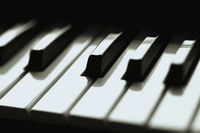Piano Sheets > Joe Henderson Sheet Music > Mamacita (ver. 1) Piano Sheet
Mamacita (ver. 1) by Joe Henderson - Piano Sheets and Free Sheet Music

About the Song
Advantages of accessing free sheet music online The internet has pervaded all aspects of our lives and when it comes to learning how to play piano this is no different. There are virtually hundreds of websites, which offer you free sheet music to help you learn how to play the piano. There are several advantages to getting online sheet music versus conventional hard copy versions.
No storage issues
One of the biggest advantages is that online sheet music does not occupy physical space as documents do. This helps you avoid unnecessary clutter
(More...)
Download this sheet!
About the Artist

Random article
Advantages of accessing free sheet music online The internet has pervaded all aspects of our lives and when it comes to learning how to play piano this is no different. There are virtually hundreds of websites, which offer you free sheet music to help you learn how to play the piano. There are several advantages to getting online sheet music versus conventional hard copy versions.
No storage issues
One of the biggest advantages is that online sheet music does not occupy physical space as documents do. This helps you avoid unnecessary clutter
(More...)
